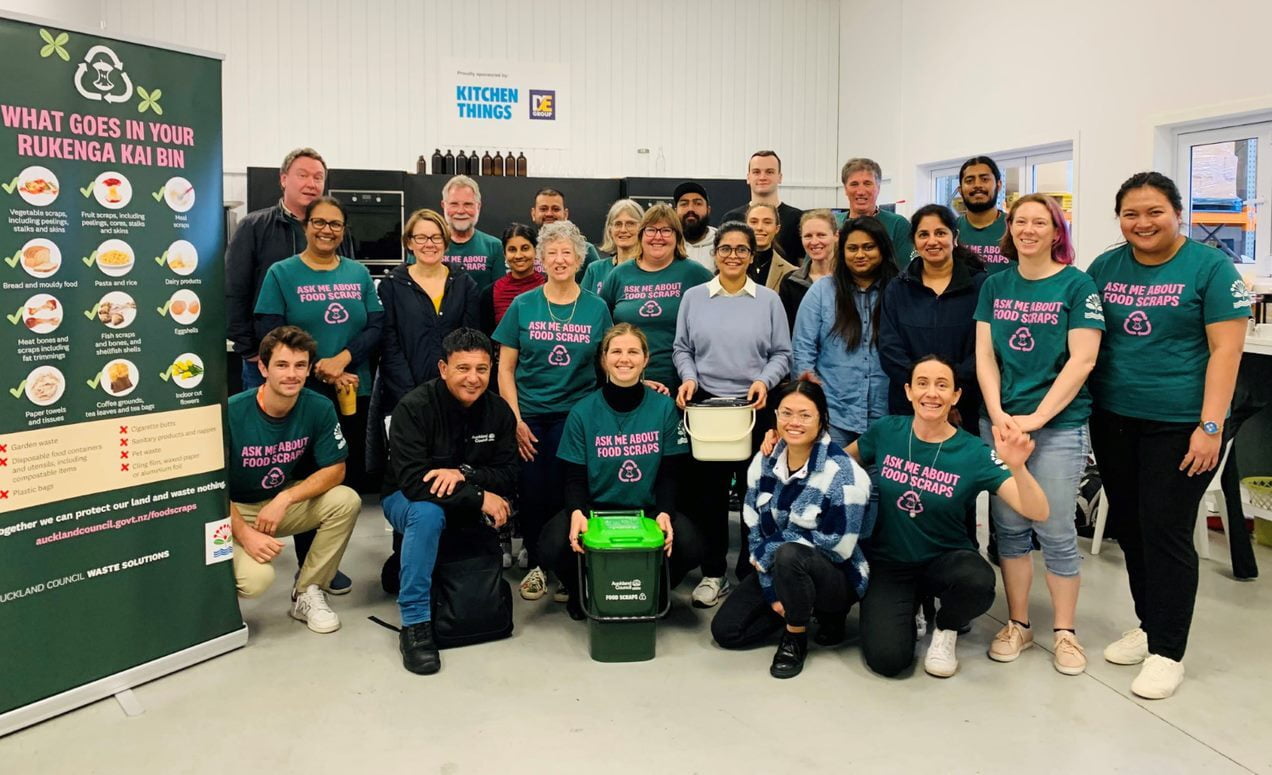With the start of standardised kerbside recycling quickly approaching, local councils across Aotearoa will be planning to launch new rubbish and recycling services.
Cayley McLean, Team Leader for Waste Planning and Projects at Tauranga City Council, led the Behaviour Change programme for the council’s rubbish, recycling and food scraps service introduced in 2021. Prior to this, Tauranga only had a council-run glass collection service. This was a big change for the community, as residents were mostly using private waste and recycling companies.
Sarah Nicholls, Programme Manager at Auckland City Council, led Tāmaki Makaurau’s new kerbside food scraps service that launched in April this year. Bins are being delivered to 500,000 households across the city and aims to divert over 35,000T of food scraps in 2024.
In this article, we talk to Sarah and Cayley about what they learnt from their respective launches.
The importance of planned communications
Sarah says consistent messaging is key, as rolling out their new service in stages resulted in some confusion amongst the community.
“In some areas we asked residents to hold on to their bins for several weeks prior to their service commencing. However, we learnt it was preferable to deliver bins the week before the collection started.”
“Not only was it a bit difficult logistically, but it meant we had to use different messaging in different parts of the city. It would have been better to be consistent,” she says.
Cayley thinks having enough time upfront to plan the different stages of communications needed within the community is crucial i.e., right message at the right time in the right place.
She also thinks it’s important to identify the budget, skills and capacity required for a successful roll out and source external suppliers where needed, such as media and creative agencies.
“Ensure there is enough of a lead in time and budget for marketing and comms. And remember, you might need to look at advertising to ensure your messaging reaches the community – which often needs to be booked well in advance.”
Both councils recommended using video as a communications tool, which can be used on social media, shown at contact centres and libraries, and used for advertising.
Although advertising is key, Cayley says there may be times where you just need to pick up the phone or have a chat over a cuppa.
“It is important to listen to those who are not supportive of change. Sometimes a quick (or long) phone call or face-to-face visit is just what they need to better understand the reasoning behind the change and resolve some underlying concerns or misconceptions.”
The negativity from the community can be tough and wear you down, so it’s important to check in with your team.
“Change can be challenging for communities, so be prepared for a mix of negative and positive comments throughout. It's important to celebrate the big and small wins along the way," Sarah says.
Internal champions
Sarah and Cayley highlight the importance building internal awareness across all departments.
“It’s important to work collaboratively across different departments from the get-go. Ensure you have enough people to implement an integrated customer service plan,” says Sarah.
They both advise reaching out to other councils to get customer service data and learn for their successes and challenges.
“We were provided with great customer service data from other councils which really helped prepare.
"Once we’d seen the data, we realised we needed more customer service staff to help answer Facebook messages, emails and calls,” says Cayley.
Although it took the whole customer service team to get through the launch, Tauranga City Council had three rubbish and recycling ‘experts’ that were the first point of call for enquiries.
“We provided them with really good messaging and frequently asked questions, so they had an answer for 99% of what came in,” says Cayley.
“Communicating ‘the why’ is key, make sure everyone knows that the long-term goal is to reduce waste.”
Sarah’s final word of advice?
“Ensure you talk to a number of councils and people who have already rolled out a service to learn from their successes and challenges - and buy good quality bins. Most importantly build a strong team and have fun along the way,” she says.
Find out more about kerbside standardisation here.
The Ministry for the Environment (MFE) have also just launched a best practice guide for communications for waste minimisation. Find it here.

Author bio - Meg Taylor-Silva
Meg Taylor-Silva is a Senior Advisor and Climate Resilience Communications Lead at Beca. She worked for several years at Tauranga City Council, where she worked on Tauranga’s kerbside rubbish and recycling service roll-out. She is passionate about behaviour change, the circular economy and preparing communities for the impacts of climate change. She was on the WasteMINZ Behaviour Change Steering Group from 2021 – 2023.

